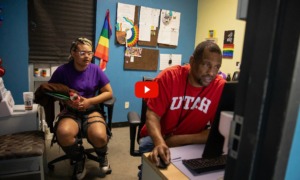 |
|
Lupe Tovar |
Program Coordinator
In My Shoes
Tucson, Ariz.
(520) 747-1533
www.inmyshoesinc.org
Age: 25
Salary: $25,000 to $30,000
About In My Shoes: This nonprofit provides one-on-one mentoring by matching foster teens with adults who were raised in foster care. It also operates after-school clubs for youth in foster care. In My Shoes was formed in 2001 by Tucson Foster Care Alumni, Casey Family Programs and Pima County Juvenile Court.
Her Job: Tover, a former foster youth, recruits and trains mentors, and plans and hosts the In My Shoes clubs. The clubs organize activities for mentors and foster youth, ages 12 to 17.
On Her 20 Years in Foster Care: “I never truly connected with a family or was in a permanent home, but I still graduated from high school and college [Arizona State University] with my class. In college, I realized I could define family and permanency in a different way. I built long-term friends through work and school, something I never had in the system.”
Best Part of the Job: “Recruiting alumni, all of whom are alumni of the foster care system, and helping them realize that their experiences give them expertise and that they are of value to the youth whom they mentor. It’s great seeing the mentors and mentees grow and evolve.”
Worst Part of the Job: “Seeing the reasons behind why some youth can’t stay in the In My Shoes clubs for the full eight-week cycle. Since foster care is temporary, these youth often have to move around … from one group home to another, and siblings may even be separated. Also, some youth are even moved to a home that doesn’t allow them to come to the club.”
Memorable Moment: “I try to plan events and activities that the youth wouldn’t normally do. So we went to [a] fair recently and they rode bumper cars and went rock climbing and had so much fun!”
Exclusive Membership: Tover believes it is important for the clubs to be exclusively for foster youth, because the “youth know everyone in the club has been through similar experiences, and they can let their guards down. There is so much growth and camaraderie.”
Recruiting Mentors: “We get the most interest from potential mentors through our local radio and TV commercials, as well as our website and word of mouth.
“When a prospective mentor calls, we briefly ask about their experiences working with youth and their availability. We then invite them to the office for the extensive application process. It’s a two-year commitment, so we have to make sure they can support the youth.”
Weeding Out: “We do a fingerprint clearance and background check, and there’s an application process. We wouldn’t want to automatically ‘X’ someone out for something they did a long time ago. But we want to be aware.”
Training: “Mentors don’t need much training. We start off by inviting mentors to events and to hang out around the facilities and get comfortable around the youth. We then either assign them to volunteer at a club or match them up with a mentee. I plan and attend the first mentor/mentee outing and provide transportation.”


























